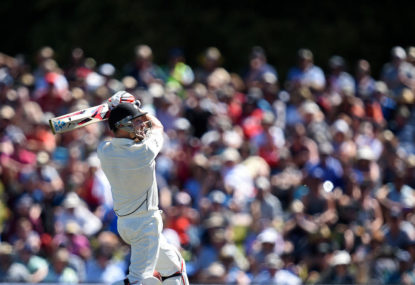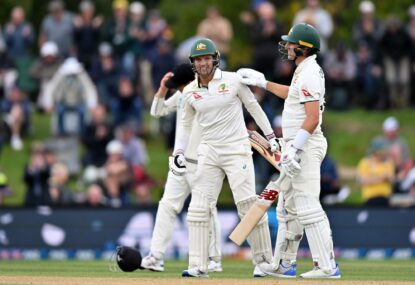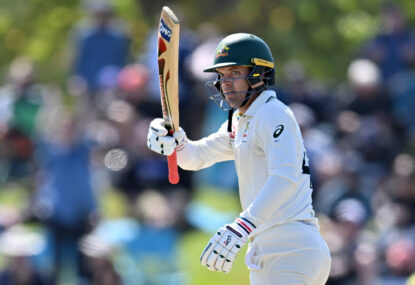There is a human fondness for prophesy. Sport’s most common and boring joke revolves around the jinx, spectators claiming responsibility when action contradicts their preceding assertion.
Of course jinxes are coincidence, though it’s repetition rather than inaccuracy that makes the joke so tiresome. Still, I couldn’t help smiling to myself at Hagley Park in Christchurch on Saturday (February 20), the first day of the final Test of Brendon McCullum’s career.
Days earlier, after his team lost the first Test in Wellington with McCullum contributing 10 runs, I wrote on this website of the captain’s poor Test record against Australia. I closed the article as follows: “With one Test to play in that career, he cannot change his ilk or his approach. But his team desperately needs McCullum’s dice to land the right way on his last roll.”
At his next journey to the crease, suddenly McCullum was a craps shooter placing service bets on four and four and throwing a string of hard eights. Roll after roll, everything was coming up Milhouse. As he scored the fastest Test hundred of all time, he couldn’t lose.
Rather than claim jinx, or reverse jinx, or a serving of humble pie, I’d rather see it as the fulfilment of a wish. What I wanted was a McCullum miracle. That wish could not have come more spectacularly true.
Brendon McCullum is a gambler. In retirement from cricket he will tend racehorses. As a one-day captain he would roll his strike bowler for ten overs in a row if he saw the chance to profit. His batting is the same: risk versus reward, with a far more generous lean towards the former than most will venture in the Test arena.
On this day, the stakes were high. Australian bowlers cavorted on a responsive pitch after sending New Zealand in. McCullum entered the fray three down for 32. His first ball was a Josh Hazlewood jaffa, moving off the seam to beat his edge. He slogged at the next towards midwicket. It flew over slip. Tom Latham had taken 40 balls to gather four runs. McCullum and good fortune matched that in two.
Kane Williamson soaked up a maiden over, then most of the next. Mitchell Marsh came on for his first bowl. The New Zealand media during the week had claimed McCullum was Marsh’s bunny. Either McCullum didn’t like that idea or he hadn’t paid it the slightest attention. One or other must have been behind him sacking 21 runs from the over.
In doing so he took down another Australian, passing Adam Gilchrist’s record of an even hundred Test sixes. First a violently simple loft down the ground, then a World Cup wallop as he ran down the pitch to flay over cover. Between those balls was a limbo cut shot for four, and a cover drive for the same.
Luck came again. A cut not far over gully, a drive through James Pattinson’s hands, a biff that just cleared mid-on. All in the one over. The first and third went for boundaries. McCullum was 36 off 16. Lunch arrived two overs later, after one last play-and-miss at Pattinson.
Marsh got Williamson straight afterwards. Corey Anderson pulled him for another six and a four. Then came the moment. A Pattinson over in which McCullum had miscued a couple, missed a couple, then slashed off the edge through gully.
The man in position was Marsh. A dive, an arm flailing out like a length of well-cooked fettuccine. A ball that somehow stuck. The Australians celebrated. The umpires went upstairs. The crowd chanted “No ball!” The third umpire agreed.
This wasn’t McCullum the gambler winning. This was McCullum dropping his wallet onto the layout while ordering a drink, then looking up to see he’d landed a hundred-to-one shot.
So on he went. Next ball, a pull that Hazlewood might have run in to catch at backward square, but hung back and chested over the boundary on the bounce. Next ball, an edge wide of slip for a single. The next, from Jackson Bird, straight past the edge again.
Then the most outrageous shot of the day, backing away, the forehand smash down the ground for six, played with barely one toe of one foot touching the ground at point of impact. His half-century had taken 34 balls. Of Bird’s next six, two went through cover, two over point, four boundaries in the bank.
Hazlewood came back. The strike bowler sent to take control. He’d conceded 11 runs from his first 10 overs. His next four would cost 57.
Anderson’s six to begin that spell would put Hazlewood off, but McCullum thrashing a perfectly good yorker so hard into the ground that it went straight for four? That can ruin a bowler’s day. There was the cover drive, the inside edge for two, the top edge over the ‘keeper, an over costing 21.
McCullum was on 82. He had rubbed the gold Buddha’s belly until it glowed like lamplight. He had fired the right joss sticks, lopped off the pertinent parts of animals, thrown a salt shaker over his shoulder while picking unusual specimens of vegetation as recommended. All luck was his.
Another top edge from Hazlewood, this time for six. Another whack just clearing mid-on. Four from the top edge again. And on 96 – how else? – yet one more charge in a career more marked by them than that of a Light Horseman. Another lofted cover drive, then arms aloft in the thick New Zealand summer sunshine.
Hagley Oval is just a grass bank, a saucer indented into lush parkland with one small pavilion the only gesture at construction. On days like this, a crowd gathers dozens deep in concentric circles from the boundary fence outward. No ground in the world leaves you feeling closer to the action.
So as McCullum rained sixes into that crowd, and as he raised his arms in salute to them, the assembled mass of his home city cheered in dazed disbelief. He could not possibly have produced a better show for them, and in a city that has suffered so much heartache in the last five years, that means everything.
It kept going, the mis-hits skewing for runs, the chances landing safely, and punctuating each of them, the attacking thrusts that found their mark. By the time it was over he had 145 from 79, he had changed the course of an innings, but most importantly, he had created a moment that will be remembered long after the result that follows grows hazy.
Years ago, in another life, I once ran roulette tables at a casino. The lifeblood of any such establishment is the addict, the one who comes in day after day, the base revenue that the house can bank forever.
One thing gambling addicts share is the myth of The Streak. Rational protests aside, any true gambler is waiting for The Streak, the winning run that will burn so hot it consumes their trouble, baking it out of their lives like moisture out of clay. A lifetime of losses only makes them surer that one day probability must deliver. Each day of waiting leaves fate deeper in their debt. The sunk cost makes it impossible to leave.
One day, they think, The Streak will arrive: win after win in a clanging cavalcade of aces and straight-ups and jackpots, a Rain Man fantasy that will absolve their debt, absorb unhappiness, and set their lives to rights like a finger nudging an errant picture on a wall. Then, they say, they will walk away from the game forever.
New Zealand’s captain is about to walk away from his game. In one session, in one afternoon, what may have been an underwhelming career against Australia was washed away. I say ‘may’ because it doesn’t matter anymore. The Streak does not exist, of course. It never did. But in Test cricket, in the first stanza of his last outing, Brendon McCullum just came as close to it as anyone ever will.
Listen to the Test on WhiteLineWireless. WhiteLineWireless is on Mixlr
This piece was originally published on Wisden India



































































































